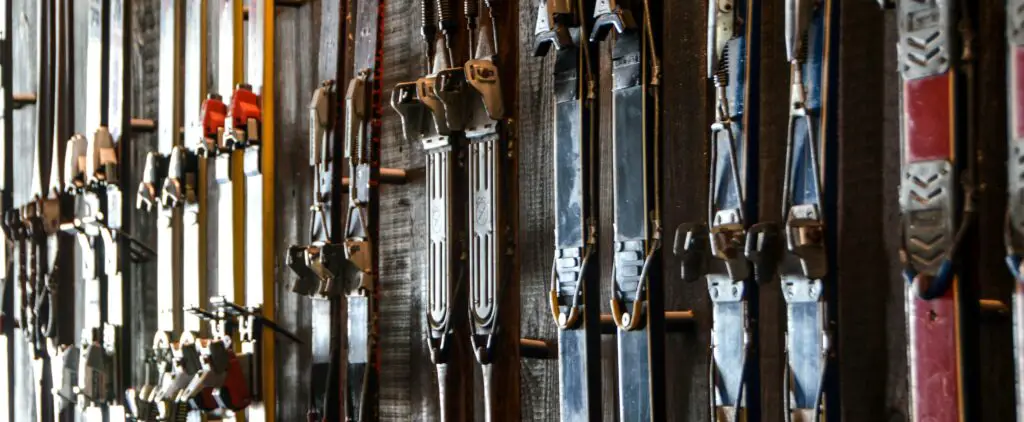Skiing equipment can get pretty heavy so it’s a good idea to know roughly how much it all weighs when you are planning to take everything to the resort. The weight of a set of skis also affects the performance and suitability for different types of skiers.
Average Weight of Skis
On average, a pair of skis weighs between 3-4 kg or 6.6-8.8 lbs. Ski bindings typically weigh 2 kg or 4.5 lbs bringing the total weight of a pair of skis and bindings to approximately 5.5 kg or 12 lbs.
| Ski Length | Average Weight (Metric) | Average Weight (Imperial) |
| 150 cm | 2.70 kg | 5.95 lbs |
| 156 cm | 3.05 kg | 6.73 lbs |
| 160 cm | 3.20 kg | 7.06 lbs |
| 164 cm | 3.26 kg | 7.19 lbs |
| 168 cm | 3.29 kg | 7.25 lbs |
| 172 cm | 3.30 kg | 7.27 lbs |
| 176 cm | 3.56 kg | 7.84 lbs |
| 180 cm | 3.77 kg | 8.32 lbs |
| 186 cm | 4.20 kg | 9.26 lbs |
| Average | 3-4 kg | 6.6-8.8 lbs |

What Affects the Weight of a Pair of Skis?
The weight of a pair of skis is affected primarily by the materials used, the length and the width.
Materials
Skis are usually made from either wood, carbon fiber of fiberglass. Wooden skis are the heaviest, followed by fiberglass and finally carbon fiber skis.
- Carbon fiber skis are more expensive since they are both stiffer and lighter than fiberglass and wooden skis making them a good option for more experienced skiers.
- Fiberglass skis with a wooden core are the most popular construction.
- Completely wooden skis are rare nowadays since they are very heavy.
Size
There are two main aspects to consider here:
- Length
- Width
Narrower skis which are designed for more advanced skiers are of course slightly lighter compared to wider skis designed for beginners.
It should go without saying but the longer the skis are, the more they will weigh. Take a look at the Armada Reliance 82 C skis as an example. They come in three lengths, all with the same 82 mm waist and wood construction.
| Ski Armada Reliance 82 C Length | Weight (kg) | Weight (lbs) |
| 150 cm | 2.55 kg | 5.6 lbs |
| 166 cm | 2.9 kg | 6.4 lbs |
| 174 cm | 3.5 kg | 7.7 lbs |
Heavy vs Light Skis
Heavier skis feel more stable and less prone to deflections by uneven terrain compared to lighter skis. However, lighter skis feel more nimble as they require less effort to manoeuvre and are also easier to carry and transport.
Pros of Lighter Skis:
- Easiest to carry and transport
- Less effort to turn and manoeuvre
- Good for alpine touring
Pros of Heavier Skis:
- Better for all-mountain skiing
- Feel more stable (less prone to deflections)
- Good for high speeds due to the extra stiffness

How Much Should My Skis Weigh?
This depends on several factors including your height, weight and style.
In general, you can categorise skis by weight into three groups:
- Light = less than 3 kg (6.6 lbs)
- Average = 3-4 kg (6.6-8.8 lbs)
- Heavy = over 4 kg (8.8 lbs)
Light skis are ideal for children and those with smaller frames as skis under 3 kg tend to have a shorter length. You can also choose very light skis for alpine touring. Average weight skis will be suitable for most adults who want to do all-mountain skiing primarily. Heavier skis offer the best performance for advanced all-mountain skiers or those with larger frames.
How Much Does Ski Equipment Weigh?
| Ski Equipment | Average Weight (Metric) | Average Weight (Imperial) |
| Pair of Skis | 3.5 kg | 7.7 lbs |
| Bindings | 2 kg | 4.5 lbs |
| Pair of Poles | 200 g | 7 oz. |
| Pair of Ski Boots | 1.8 kg | 4 lbs |
| Ski Helmet | 750 g | 1.65 lbs |
| Snow Goggles | 450 g | 1 lbs |
| Total | 8.7 kg | 19.3 lbs |

